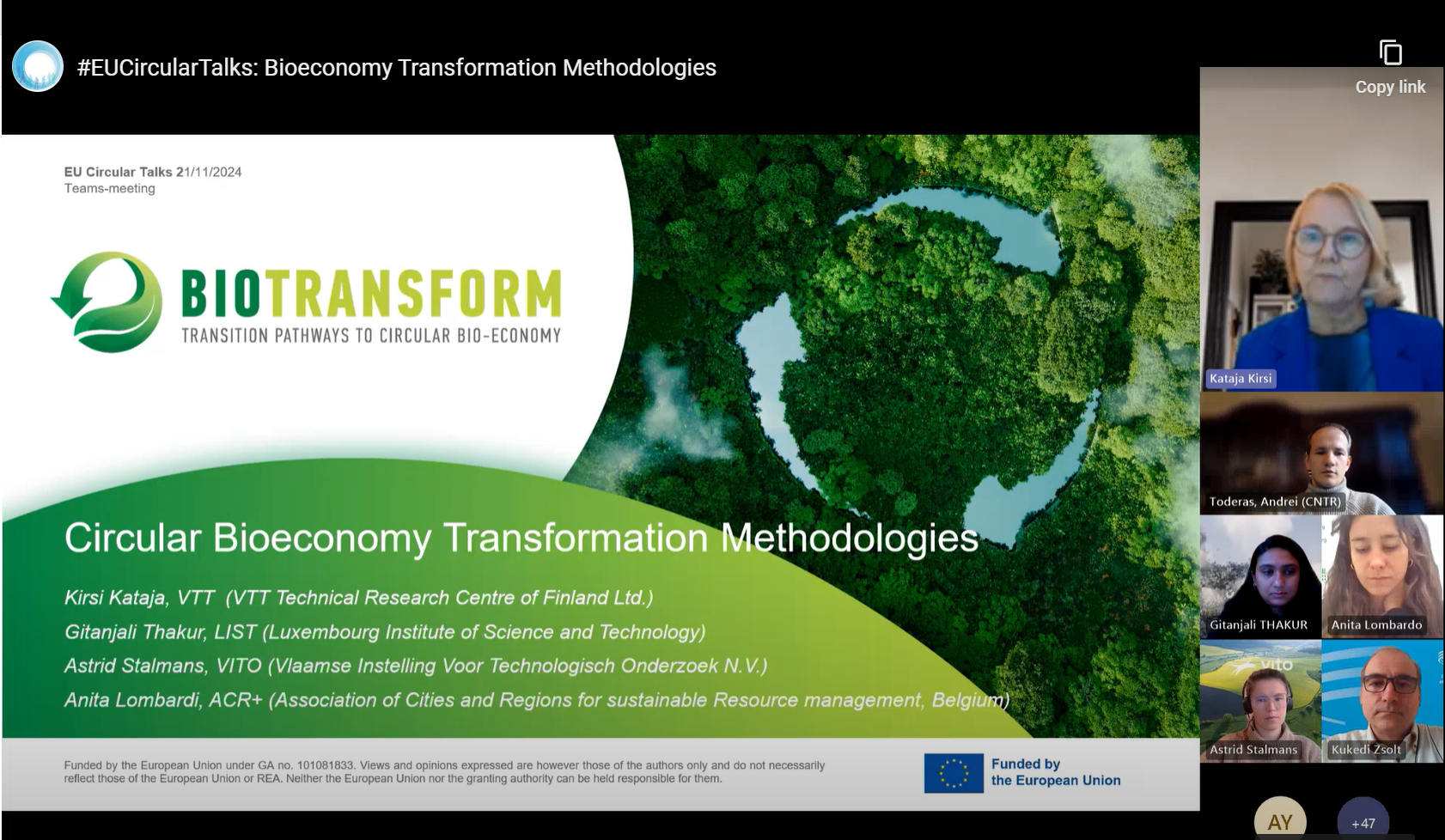On November 21st 2024, in collaboration with the European Circular Economy stakeholder platform (ECESP), the BIOTRANSFORM project hosted a 2-hour online workshop focused on Circular Bioeconomy Transformation Methodologies.
The webinar engaged a diverse range of stakeholders, including representatives from academia, regional and local authorities, and business consultancies.
During the first session, BIOTRANSFORM (BT) partners presented the transition framework developed and tested across the project’s six (6) case study regions in Austria, Czechia, Germany, Greece, Finland, and Spain. The BT partners also shared key findings from the Life Cycle Assessment (LCA) analysis and application of the Moov Tool to the Finnish and Spanish cases respectively.
The central focus of the webinar was the participation of three (3) regional stakeholders involved in BT activities in the Finnish and Greek case study. Two speakers from Finland, representing the city authority of Äänekoski and the Finnish forest industry federation, along with a representative from the council for development and innovation from Peloponnese region in Greece. The speakers shared insights on the potential challenges and opportunities of implementing the BT framework in the regions and industries they represent.
The Finnish representatives provided positive feedback on the BT methods and results, noting the alignment with ongoing developments in Finland. The selected lignin pathway reflects a current reality, where the potential of this feedstock for biobased materials production is actively being explored. However, the implementation of this pathway leads to tradeoffs: black liquor, which serves as an input for biobased material production, is diverted from renewable energy production processes. To mitigate this impact and prevent a shift back to fossil-based sources, it is essential to secure financial support at the EU level.
Regarding the potential use of BT tools and methods, there is significant replicability potential in Äänekoski in support of a relevant biogas development project. However, several limitations were identified, particularly in the use of LCA as a decision-making tool. While LCA is valuable for supporting the transition to sustainable practices, its results can be influenced by assumptions and selective data, potentially undermining objectivity. Additionally, the forest industry federation representative recommended comparing the LCA results from the BT project with those conducted by Finnish companies to validate the BT methodology and further enhance the robustness of it.
The representative from the Peloponnese Development and Innovation council highlighted several challenges associated with transitioning to biobased systems in southern European regions. These include the fragmentation of biomass stocks and the current political emphasis on renewable energy production, which often overlooks the primary sector. In this context, BT tools, such as the Moov logistics tool can play a pivotal role in ensuring that the necessary critical mass of raw materials is available in the right locations to continuously support bio-based businesses.
In the third and final session of the workshop, two additional European regions -Fryslan in Netherlands and Pays de la Loire in France- presented their ongoing activities and strategies to promote Circular Bioeconomy, along with successful governance models. Fryslan region has focused on the use of bio-based materials, such as hemp for construction purposes. Pays de la Loire region highlighted its role as a facilitator in various bioeconomy discussion platforms, including a bi-yearly working group with other French regions and the regional “Bioeco hub”. Additionally, the region presented its annual call for circular economy projects , which allocates funding specifically for bioeconomy initiatives. A key takeaway from this session was the critical role of regional authorities in fostering collaboration among stakeholders, consulting and engaging them in co-developing regional visions and priorities.
The webinar provided a valuable platform to engage with regions involved in the BT project and collecting feedback on the transition framework developed. Additionally, it highlighted compelling examples of successful governance structures from diverse Europe regions that are driving the transition to a circular bioeconomy.
You can view the full EU Circular Talk and access the speakers’ presentations here.




